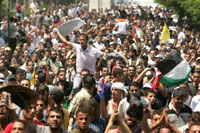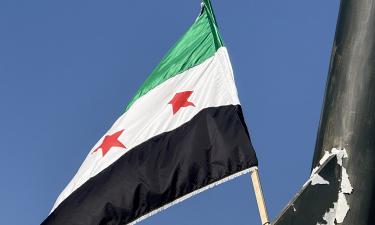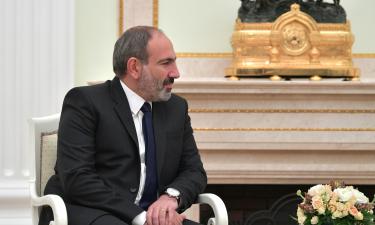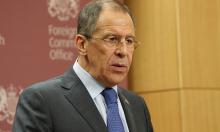Gaza Strip protests against US-hosted Mideast conference
Scores of people staged demonstrations in the Gaza Strip against the U.S.-hosted Mideast peace conference while the leader of the Hamas government in Gaza insisted that the summit is "doomed to failure" and said the group will not lay down its arms.

The comments by Ismail Haniyeh, group's top leader in Gaza, came as protesters began filling a huge square in Gaza City, chanting "Death to America" and "Death to Israel" and calling Palestinian President Mahmoud Abbas a "collaborator" for attending the gathering at Annapolis, Maryland.
Smaller demonstrations were held in Abbas' West Bank stronghold. Enforcing a ban on such protests, police violently broke up the gatherings, firing bullets above protesters' heads, beating people with sticks and arresting dozens. Hospital officials reported four serious injuries, and reporters covering the protests were harassed by police.
In other violence, Israeli troops shot dead two Hamas militants in separate incidents early Tuesday in the Gaza Strip, the army and Islamic group said. On Monday, four Palestinians were killed by Israeli troops in Gaza.
"Annapolis is a disaster for us," said Amina Hasanat, a 37-year-old mother of eight who demonstrated in Gaza City. Dressed in a black robe and black and green headband, she predicted the conference would end in failure. "This will be an advantage for the resistance," she said.
Gaza's Hamas rulers have been staging daily demonstrations against the U.S.-hosted conference, restating their commitment to Israel's destruction and promising to reject any decisions that come out of Annapolis. The criticism has grown increasingly vitriolic, with one Hamas leader on Monday calling Abbas a "traitor."
Polls show that a majority of both Palestinians and Israelis favor a negotiated settlement to their century-old conflict. However, a majority on each side is also skeptical that the current peace push will bear fruit.
Hamas violently seized control of Gaza last June after routing forces loyal to Abbas, and the president's lack of control of Gaza has raised questions about his ability to carry out a future peace deal. Israeli Prime Minister Ehud Olmert has said he will not implement a peace agreement without a halt to militant attacks emanating from Gaza.
Speaking to reporters Monday, Olmert noted that the U.S.-backed "road map" peace plan calls on the Palestinians to disarm militants. "We will not be able to accept the fact that they (the Palestinians) will be relieved of the obligation to prevent terrorism from the Gaza Strip," he said.
In his speech, Haniyeh said his group would not disarm.
"We will stand firmly in the face of policies that attack the will of our people, our factions and our weapons of resistance," Haniyeh said. "We reaffirm the legitimacy of resistance and support it as a natural right."
"We are sure that the Annapolis conference will not change the reality of history and geography," he added. "Any conference that goes beyond this reality is doomed to failure."
After Haniyeh's speech, the Gaza protestgained strength, beginning with several thousand pro-Hamas university students and quickly growing into tens of thousands of people. Smaller militant groups, including Islamic Jihad, also took part.
"Today you are here to send a message to ... say the land of Palestine is not for sale," said Mahmoud Zahar, a fiery Hamas leader. "Whoever thinks we will recognize a Jewish state ... are deluding themselves.There will be no recognition of the state of Israel."
Despite the harsh language, the gathering was more subdued than past Hamas rallies. Many demonstrators milled about and appeared disinterested during the speeches.
Children played or enjoyed ice cream, and women chatted with each other. Unlike other Hamas rallies, there were no public displays of weapons, though protest organizers tried to energize the crowd by playing recordings of gunfire.
Smaller demonstrations against Annapolis took place in the West Bank despite a ban issued by Abbas.
The protesters were mostly from the "Party of Liberation," a fringe group that calls for Muslim rule world-wide and does not recognize Abbas' Palestinian Authority as their legitimate government.
In Ramallah, around 1,000 supporters waving their movement's black flag tried to march from a large mosque in the town's center, but were immediately surrounded by police, who began rapidly firing live ammunition over their heads to disperse the crowd.
Many ran back into the mosque and were surrounded. Police beat protesters with sticks on the streets in an attempt to disperse the protests. Police beat a correspondent working for the pan-Arab news channel al-Jazeera, Wael Shuyoukhi, injuring his hand. No other injuries were reported. Around 150 people were arrested, an official said.
In Hebron, police and hundreds of protesters threw stones at each other, even as security men fired bullets into the air. Around 50 protesters was arrested, and eight were lightly injured, officials said.
There were similar scenes of chaos in the northern West Bank towns of Nablus and Jenin. Police tried to prevent reporters from covering the protests, and snatched the camera of an AP photographer in Nablus.
On Sunday, Abbas' foreign minister, Riad Malki, said the government would not tolerate any demonstrations against the conference, to preserve "stability and security."
"We are against violence, but there are limits. The protesters shouldn't have practiced any violence," said Ahmed Kabaha, an aide to Malki.
On the Israeli side, Olmert will return home to face opposition to his peace moves.
In Jerusalem, more than 20,000 Israelis gathered Monday at the Western Wall, the holiest site where Jews can pray, to protest the Annapolis conference. Many marched to a square near Olmert's residence for a noisy demonstration.
Hardline Israeli opposition leader Benjamin Netanyahu denounced the conference on Monday. "The Palestinians are not lifting a finger to stop terror or recognize Israel as a Jewish state," he told Channel 2 TV. "I see this summit as a continuation of one-sided concessions."
Subscribe to Pravda.Ru Telegram channel, Facebook, RSS!




